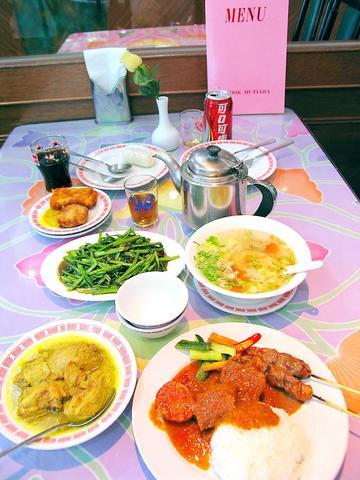One of the irritations of eating international cuisine in Taipei is that it generally has the same underlying flavor as local foods. The oil used in the preparation of the dish doesn't seem to vary, the ingredients are all local and the cooks, though capable, create a meal that is labeled differently but may as well have come from the same kitchen.
It was therefore something of an "ah-ha experience" when I sampled the nasi goreng at Pondok Mutiara Restaurant. Not unlike Proust and his madeleine, I was transported back in time and a couple of thousand of kilometers away to Indonesia, where I first enjoyed the dish. It had an authentic taste. It may have been just refried rice, onion, garlic, chili and soy sauce, with the addition of shrimp paste, a lightly fried egg, some cucumber slices and prawn crackers on top -- but it didn't taste like Chinese food.
It obviously helps that Diana Lu Chang (張盧鵬英) was originally from Indonesia (albeit 45 years ago) and still has ties with the country. She started her family-run restaurant 27 years ago and it has been at its present address on Fuxing North Road for over 10 years. Chang has become something of a celebrity and is often invited to demonstrate her culinary skills on Formosa TV.

PHOTO: JULES QUARTLY, TAIPEI TIMES
We sampled one of the set meals and added some dishes, which gave us a range of flavors: from the coconut curried chicken; to the Holland spring rolls of chicken, butter and mustard, wrapped in a thin wheat flour pastry; to the uniquely Indonesian shrimp paste-flavored vegetables; and the condensed milk, ice and sweets confection that came at the end. Chang recommended the curry fish heads, for the brave, and rendang sapi, a spicy beef dish in coconut and chili sauce.
We were full but a meal would not be complete, she said, without sampling the homemade thousand-layer cake and some Javanese coffee. She was right. The coffee was strong, dark and full of character. The cake was delicious, light, honeyed and satisfying. We were told that there were, in fact, only 18 layers. Further research found that it is quite an art to contrive a genuine thousand-layer cake (it is made of flour, yeast, sugar, lard and red dates, steamed, rolled and folded) and that it was originally a Chinese recipe. Boxes of the cake are sold on the premises as the "authentic taste of the Dutch royal family."
Some restaurant critics would take issue with the decor. They might say the place had an antiquated feel, that the lighting and general appearance were uncoordinated. Such comments put style before substance and are incidental to the food and the enjoyment of "authentic" cuisine.
Selamat Makan (enjoy your meal).

Google unveiled an artificial intelligence tool Wednesday that its scientists said would help unravel the mysteries of the human genome — and could one day lead to new treatments for diseases. The deep learning model AlphaGenome was hailed by outside researchers as a “breakthrough” that would let scientists study and even simulate the roots of difficult-to-treat genetic diseases. While the first complete map of the human genome in 2003 “gave us the book of life, reading it remained a challenge,” Pushmeet Kohli, vice president of research at Google DeepMind, told journalists. “We have the text,” he said, which is a sequence of

On a harsh winter afternoon last month, 2,000 protesters marched and chanted slogans such as “CCP out” and “Korea for Koreans” in Seoul’s popular Gangnam District. Participants — mostly students — wore caps printed with the Chinese characters for “exterminate communism” (滅共) and held banners reading “Heaven will destroy the Chinese Communist Party” (天滅中共). During the march, Park Jun-young, the leader of the protest organizer “Free University,” a conservative youth movement, who was on a hunger strike, collapsed after delivering a speech in sub-zero temperatures and was later hospitalized. Several protesters shaved their heads at the end of the demonstration. A

In August of 1949 American journalist Darrell Berrigan toured occupied Formosa and on Aug. 13 published “Should We Grab Formosa?” in the Saturday Evening Post. Berrigan, cataloguing the numerous horrors of corruption and looting the occupying Republic of China (ROC) was inflicting on the locals, advocated outright annexation of Taiwan by the US. He contended the islanders would welcome that. Berrigan also observed that the islanders were planning another revolt, and wrote of their “island nationalism.” The US position on Taiwan was well known there, and islanders, he said, had told him of US official statements that Taiwan had not

We have reached the point where, on any given day, it has become shocking if nothing shocking is happening in the news. This is especially true of Taiwan, which is in the crosshairs of the Chinese Communist Party (CCP), uniquely vulnerable to events happening in the US and Japan and where domestic politics has turned toxic and self-destructive. There are big forces at play far beyond our ability to control them. Feelings of helplessness are no joke and can lead to serious health issues. It should come as no surprise that a Strategic Market Research report is predicting a Compound